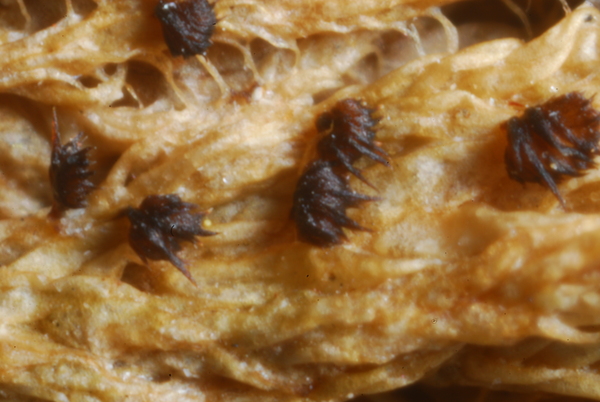Gyalideopsis calabrica Puntillo & Vězda
Webbia, 46: 159, 1991.
Synonyms:
Distribution: S - Cal (Puntillo 1996).
Description: Thallus crustose, very thin and film-like, the hyphae often penetrating inside the cells of mosses, grey-green, sometimes poorly visible. Hyphophores hooked, 0.12-0.15 mm wide, shortly stalked, brown or brown-black, forming an apical flange with several short, lateral projections. Diahyphae filiform, multi-septate, not constricted at septa, 70-150 x c. 1.5 µm, straight or slightly curved. Apothecia unknown. Photobiont chlorococcoid. Spot tests: thallus K-, C-, KC-, P-, UV-. Chemistry: without lichen substances.
Note: on epiphytic bryophytes and on bark of Fagus in old, undisturbed, very humid forests. This species might prove to be a synonym of G. muscicola P. James & Vězda : the species was established on account of its filiform versus presumably moniliform diahyphae in G. muscicola, but the latter species is characterised by filiform diahyphae as well (see Lücking & al. 2006). It is included in the Italian red list of epiphytic lichens as “Critically Endangered” (Nascimbene & al. 2013c).
Growth form: Crustose
Substrata: bark
Photobiont: green algae other than Trentepohlia
Reproductive strategy: mainly asexual, by conidia and thalloconidia
Commonnes-rarity: (info)
Alpine belt: absent
Subalpine belt: absent
Oromediterranean belt: absent
Montane belt: extremely rare
Submediterranean belt: absent
Padanian area: absent
Humid submediterranean belt: absent
Humid mediterranean belt: absent
Dry mediterranean belt: absent

Predictive model
Herbarium samples
Growth form: Crustose
Substrata: bark
Photobiont: green algae other than Trentepohlia
Reproductive strategy: mainly asexual, by conidia and thalloconidia
Commonnes-rarity: (info)
Alpine belt: absent
Subalpine belt: absent
Oromediterranean belt: absent
Montane belt: extremely rare
Submediterranean belt: absent
Padanian area: absent
Humid submediterranean belt: absent
Humid mediterranean belt: absent
Dry mediterranean belt: absent

Predictive model
| Herbarium samples |
 INDEX FUNGORUM
INDEX FUNGORUM
 GBIF
GBIF



